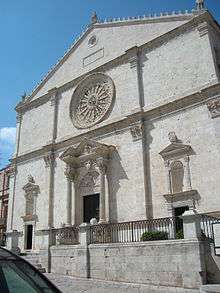Acquaviva delle Fonti Cathedral

Acquaviva Cathedral (Italian: Duomo di Acquaviva delle Fonti, Concattedrale di Sant'Eustachio) is the principal church of Acquaviva delle Fonti in Apulia, Italy. The dedication is to Saint Eustace. It is now a co-cathedral of the Diocese of Altamura-Gravina-Acquaviva delle Fonti. Previously it was the palatine church of Acquaviva delle Fonti, which became part of the territorial prelature of Altamura e Acquaviva delle Fonti formed by Pius IX in 1848, when he added Acquaviva to the existing territorial prelature of Altamura.
History
A Romanesque church was built in the 12th century (from 1158 onwards) on the ruins of a shrine of Messapian origin, by order of the Norman lord Roberto Gurguglione. The church was originally dedicated to the Assumption of the Blessed Virgin Mary.
The increasing population rendered the building too small, and from 1529 an enlargement and reconstruction in Renaissance style began under Giovanni Antonio Donato Acquaviva. It was opened to worship in 1594 under Alberto Acquaviva, and re-dedicated to Saint Eustace in 1623 by Ascanio Gesualdo, Archbishop of Bari and Canosa.
From its inception it was declared a "palatine" church, that is, one belonging to the king (from the Latin palatium: "royal palace"), probably in order to keep it out of the hands of the archbishops of Bari. Palatine churches, of which there were four in Apulia,[1] were exempt from episcopal jurisdiction, and came instead under that of the sovereign, who usually nominated and paid their clergy.
Notes
- ↑ the others were Altamura Cathedral, the Basilica of San Nicola in Bari and the church of Monte Sant'Angelo sul Gargano.
Coordinates: 40°53′48″N 16°50′30″E / 40.8967°N 16.8417°E